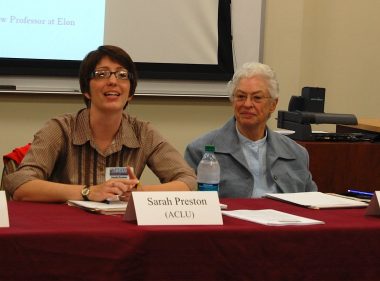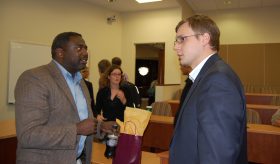Student organizations at Elon Law hosted an Oct. 11 panel discussion on marriage equality prompted by the North Carolina General Assembly's recent decision to allow a same-sex marriage ban amendment to go before voters in the May 2012 elections.

The panel included Marcus Brandon (D-High Point), a representative in the North Carolina House of Representatives; Sarah Preston, the policy director for the American Civil Liberties Union of North Carolina, Lenny Gerber, an attorney who specializes in estate planning and family law issues faced by the LGBT community; and Sonya Garza, an assistant professor of law at Elon Law.
Approximately 75 students, faculty and community members attended the event hosted by the following law school student organizations: Law School Democrats, the Elon Chapter of the American Civil Liberties Union, the Elon Chapter of the American Constitution Society, and Outlaw, an organization for LGBT students and allies.
The panelists were asked to make opening statements about their view of the proposed amendment based on their area of interests and expertise.
Preston, who manages statewide legislative programs of North Carolina’s ACLU, discussed problems with the language of the proposed amendment. She noted inconsistencies in the language the voters will see on the ballot and the effect that language may have if written into the state constitution.
“At the very least we can say this language is untested and confusing,” Preston said.

Garza expressed concerns about the indirect consequences of such a ban on the custody of children who have same-sex parents.
“I think it’s not moral to create a class of children that will basically be looked at as illegitimate,” said Garza, explaining that issues could arise when one parent in a same-sex partnership fleas with a child to a state where their partnership is not recognized. The parental rights of the other parent could go unrecognized, she said.
“That is when a state is saying ‘Child, you’re not entitled to two parents because they are from the same sex,’” Garza said.
The panel, moderated by third-year student Brennan Aberle, also discussed voter turnout strategies and the negative impact the amendment would have on all unmarried couples currently receiving certain types of employment benefits throughout the state.
During the question and answer portion of the discussion, second-year student Lincoln Bennett asked the panelists for advice on opening up lines of communications when advocating against the amendment.
Representative Brandon, the only openly gay representative currently serving in the General Assembly, stressed the importance of discussing marriage equality issues with people in ways that they are comfortable relating, especially when discussing people’s religious concerns.
“You have to be able to meet people where they are,” said Brandon. “We have a lot to talk about and we have to talk about it in a way that is going to move people from one place to the next.”
State Representative Pricey Harrison (D-Greensboro) was scheduled to sit on the panel but was unable to attend due to an unexpected conflict.
By Courtney Roller L‘14


